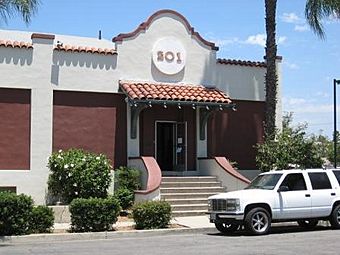Elephant Packing House facts for kids
Quick facts for kids |
|
|
Elephant Packing House
|
|

Mission Revival Style entrance.
|
|
| Location | 201 W. Truslow Ave., Fullerton, California |
|---|---|
| Built | 1924 |
| Architectural style | Mission Revival— Spanish Colonial revival |
| NRHP reference No. | 83001214 |
| Added to NRHP | September 21, 1983 |
The Elephant Packing House was built in 1924. It is located in Fullerton, a city in Orange County, Southern California. This building was once a busy place where Valencia oranges were prepared for shipping.
Orange County got its name from the many orange orchards that used to cover the land. A person named William Wolfskill helped grow a lot of Valencia oranges here in the 1800s. The Elephant Packing House is one of the few buildings left that shows how important citrus farming was in Fullerton's past.
Contents
History of the Packing House
Why it was Built
The Elephant Packing House was built in 1924. The Union Pacific Railway constructed it. It was meant to work with the train station nearby.
Packing Oranges
This large building, about 23,000 square feet, first shipped oranges under the "Elephant" name. Later, a grower named C.C. Chapman rented it. He used it to pack his "Old Mission" brand oranges.
After the Oranges
After it was no longer used for oranges, the building became a warehouse. A company that sold lawn furniture used it for a while. In 1960, the Union Pacific Railway sold the building. Since then, different businesses have used the space. The building was made bigger in 1971. The original train station was moved to a new spot.
What the Packing House Looks Like
Building Style
The Elephant Packing House has a special look. Its design is mostly in the Mission Revival Style. It also has parts that look like the Spanish Colonial Revival Style. These styles were popular in California. They often feature stucco walls, red tile roofs, and arches.
Size and Features
The main part of the building is about 165 feet long and 70 feet wide. It has one main floor above the ground. There is also a full basement underneath. The inside of the building gets light from two special "sawtooth" roofs. These roofs have windows that face north. The north side of the building is right next to the old railroad tracks.
Shipping by Train
Connecting to the Railroad
The Elephant Packing House was built right on the Union Pacific Railroad line. This was very important for business. It allowed oranges to be shipped easily to the East Coast and other places. Today, this train line is no longer used for shipping.
Nearby Train Station
A Mission Revival Style Union Pacific Railroad railway station was already next to the packing house. It was built in 1923. This old station has been saved and moved. It is now at the Fullerton Transportation Center. It sits next to the Atchison, Topeka and Santa Fe Railway station, which was built in 1930.
All three of these historic buildings are special. They are listed on the National Register of Historic Places. This means they are important parts of history.



